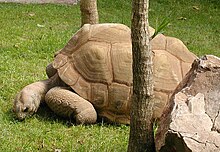Chuannanchelys
| Cryptodira Temporal range: Early Jurassic—Present, 190–0 Ma |
|
|---|---|
 |
|
| Aldabra giant tortoise (Aldabrachelys gigantea) | |
| Scientific classification | |
| Kingdom: | Animalia |
| Phylum: | Chordata |
| Class: | Reptilia |
| Order: | Testudines |
| Suborder: |
Cryptodira Cope, 1868 |
| Subgroups | |
| Synonyms | |
|
Cryptoderes Duméril and Bibron, 1834 |
|
Cryptoderes Duméril and Bibron, 1834
Cryptodera Lichtenstein, 1856
Cryptodira Cope, 1868
Cryptodiramorpha Lee, 1995
Pancryptodira Joyce, Parham, and Gauthier, 2004
Cryptodira is a suborder of Testudines that includes most living tortoises and turtles. Cryptodira differ from Pleurodira (side-neck turtles) in that they lower their necks and pull the heads straight back into the shells, instead of folding their necks sideways along the body under the shells' margins. They include among their species freshwater turtles, snapping turtles, tortoises, soft-shell turtles, and sea turtles.
Cryptodires evolved during the Jurassic period, and by the end of the Jurassic had almost completely replaced pleurodires in the lakes and rivers, while beginning to develop land-based species. Meanwhile, pleurodires became the dominant freshwater testudines in the Cretaceous to Eocene of Europe, and produced a family of marine species, the Bothremydidae.
The Cryptodira suborder has three living superfamilies, the Chelonioidea (sea turtles), Testudinoidea (tortoises and pond turtles), and Trionychoidea (soft-shell turtles and relatives). The families within the Kinosternoidea are now recognized as a paraphyletic assemblage of mostly primitive Trionychoidea; they do not form a natural group.
...
Wikipedia
